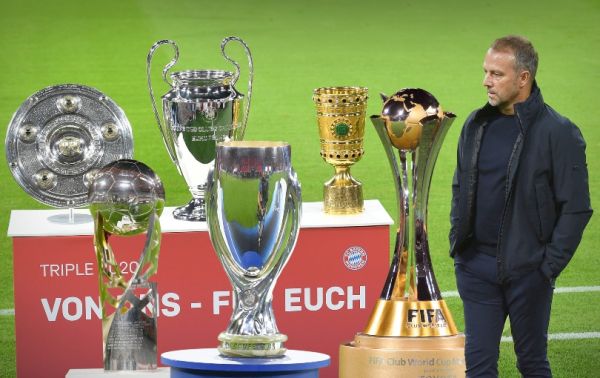Champions League holders Bayern Munich look stronger than ever at a time when many of Europe’s elite clubs are struggling. How do they institutionalise success so well?
Judging by both domestic and continental success, Bayern Munich were undoubtedly one of the most successful club of the 2010s. But so far the 2020s have been big even by their own standards, lifting six trophies – the Bundesliga, DFB-Pokal, Champions League, German and European Super Cups and the FIFA Club World Cup – in the last 15 months.
Their road to glory was not built upon a massive injection of cash or a state-funded takeover, but rather was a result of some world-class management, which has ensured that they are staying at the very top for a long period of time too.
Bayern are not alone in having a bedrock of institutional domestic success or access to world-class players – such as the Arjen Robben/Franck Ribery ‘Robbery‘ axis for much of the past decade – so what’s different?
Germany’s 50+1 fan-ownership rule certainly helps. Bayern Munich, being a club with such a big stature and global reach, can easily go above 51% because of the sheer number of members they can attract – almost 300,000 currently. Membership costs range from €20 to a standard rate of €60, but if we presume that the average membership fee paid by each individual is towards the lower end – say, €30 – then Bayern woukd still make €9 million a year through membership fees alone.
Then, there is Bayern’s absurdly good transfer business – supported, of course, by a world-class scouting department.
Free transfers are one of Bayern Munich’s specialities. From Uli Hoeness and Hasan Salihamidžić to Robert Lewandowski and Thomas Müller, Bayern Munich’s past and present has been built upon free transfers.
Take Bayern’s most-used starting line-up in this season’s Bundesliga:

Even when they are opening their wallets, Bayern Munich typically do not have to dig too deep. There are four cases of blatant daylight robbery in that line-up – David Alaba, Serge Gnabry, Joshua Kimmich and Joshua Kimmich. These are not prices out of reach for even lower-table Premier League sides.
Better yet, Bayern Munich know when to sell. Their current squad only has one player who is older than 33, and he happens to be a goalkeeper. A prime example of their shrewd selling is the recent departure of Thiago to Liverpool. Die Roten signed him from Barcelona for €25m when he was 22 years old, and after getting seven years of prime football out of him, they let him go for nearly the same fee as he neared 30 years of age and had just one year remaining on his contract.
This is another area where Bayern Munich are the best – replacing departing stars. The farewell of the legendary duo Arjen Robben and Franck Ribéry proved this. Before the pair left at the end of the 2018/19 season, they had already been working with their successors for a few years. Young Werder Bremen star Serge Gnabry had been signed in 2017, and at the same time, Kingsley Coman’s loan move from Juventus was made permanent. The two had already matured into fine players by 2019, so they seamlessly took over.
Looking at the future, Bayern Munich’s world-class scouting department gets to work. The likes of Jamal Musiala, Joshua Zirkzee and Bright Arrey-Mbi were all relative unknowns in the footballing world when Bayern signed them, but now they are the next big things.
The power to attract such top talents is a result of their sustained success. This can only be achieved with world-class managers in charge – yet another area where Bayern Munich have been near-impeccable. Since Otmar Hitzfeld’s effective retirement from club-coaching in 2008, five of the club’s seven permanent managers have been Louis Van Gaal, Jupp Heynckes (who had two long-term spells), Pep Guardiola, Carlo Ancelotti, and now Hansi Flick.
Perhaps the most crucial point, though, is the components of their board. While business-oriented executives such as a Herbert Hainer and Jörg Wacker hold key positions, footballing brains like Karl-Hainz Rummenige, Hasan Salihamidžić, Oliver Kahn, Uli Hoeness and Franz Beckenbauer have a say in most matters too.
This system ensures that while there are all sorts of smart people helping the club arrive at the theoretically correct decisions, people who have invested their lives for the Bayern cause and hold the club’s interest above everything else are always present to ensure no funny business goes on.
A combination of all of these factors has led to the creation of one of the most formidable sides in Europe, not just for a season or two, but for a sustained spell spanning generations of players.
This story originally appeared on FourFourTwo.com





